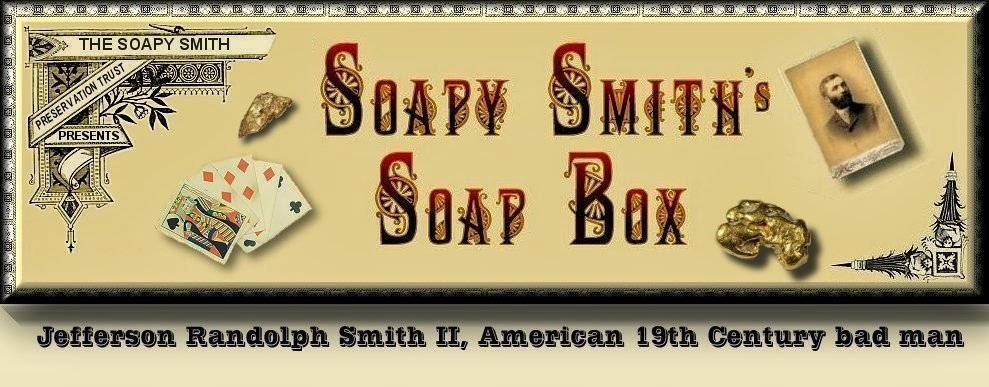For your enjoyment and education today is the general operation of the prize package soap sell racket from the book, Fools of Fortune, by John Philip Quinn 1890.
THE "SOAP GAME."
This is a trick of confidence operators which often proves exceedingly successful in extracting money from the pockets of men who consider themselves fairly well versed in the knowledge of the world. The outfit is very simple, and by no means expensive. A number of small cakes of soap of no particular value are procured, or sometimes soap is bought in bars, which are cut into pieces of the desired size. A quantity of cheap pasteboard boxes, each having a drawer somewhat larger than is the piece of soap which it is to contain, are procured and soap placed inside of them. In order to work the game, a room-usually one opening off the street-is rented. The "soap man" takes his position on a raised platform, and when a crowd has gathered to see what is going on he takes out a cake of cleansing soap, i.e., a preparation for removing grease and similar substances from cloth. He proceeds to expatiate upon its merits, illustrating his remarks by experimental demonstration. If he is a good talker, and intersperses his remarks with a few interesting anecdotes, he succeeds in attracting and keeping the interest of his audience. When he has proceeded far enough in his remarks he informs his listeners that the manufacturers of this wonderful preparation are seeking to intro- duce it in a somewhat novel way; that they propose to place a given amount of currency in a certain number of boxes together with a cake of soap in each. These boxes, he says, will be thoroughly mixed and every purchaser will be allowed to select any three boxes (the price of which will be $1.00) from the entire number offered. To prove his sincerity and truthfulness he draws from his pocket several bills, of denominations ranging from $1.00 to $20.00, and announces that he will place them inside the boxes in the presence of the crowd. He takes the bills in his hand, one at a time, folds them up carefully, and apparently inserts them in the boxes. Each box, after the bank note has been placed in it, is dropped into a large leather satchel. When he has disposed of all the bills, he takes the satchel in both hands and shakes it, with a view to thoroughly mixing the boxes. He then opens it and offers to allow any one present to select three boxes on the payment of one dollar. It is the easiest thing in the world to sell the soap, but no legitimate purchaser ever succeeds in obtaining more than a single dollar bill. The reason is that the vendor adroitly "palms" off the bills of larger denominations, substituting therefor dollar bills which he has previously rolled up and which he holds in his hand at the time that he apparently inserts the large bills into the boxes in the presence of the spectators. In other words, when the boxes have been dropped into the satchel and mixed none of them contain a note of a larger denomination than one dollar, the confidence man having still in his possession all of the large bills. When it is remembered that not more than one box in ten contains any money whatever, the chances of drawing a prize are readily seen to be exceedingly small. The buyers, however, believe that they have seen the large bills placed in the boxes before their eyes, and part with their money very readily. It may be easily seen that "cappers" are almost indispensable in this as in so many other confidence games. It is not necessary that any signal should pass between the confederates. The "capper" usually places his three boxes in his pocket as soon as he has purchased them. Someone in the crowd is always certain to ask him to open them. At first he objects, but finally yields to persuasion. He takes out three boxes from his pocket and one of them is always found to contain a large bill. The explanation of his apparent good luck is very simple. When he puts the three boxes in his pocket he had there another one, precisely similar in size and appearance, containing the bank note which he exhibits to the crowd. When he drew three boxes from his pocket, he took the one which he previously placed there together with two of those which he had taken from the bag.
 |
| Tom Biss as Soapy Smith Skagway, Alaska circa 1970s |
Prize package soap sell swindle: pages 8, 15, 37-39, 41, 43, 45-56, 48, 51, 55-56, 58, 75, 95-97, 106, 119-120, 149, 159, 163, 410, 464, 485.
Jeff Smith
.





No comments:
Post a Comment
Thank you for leaving your comment and/or question on my blog. I always read, and will answer all questions asap. Please know that they are greatly appreciated. -Jeff Smith